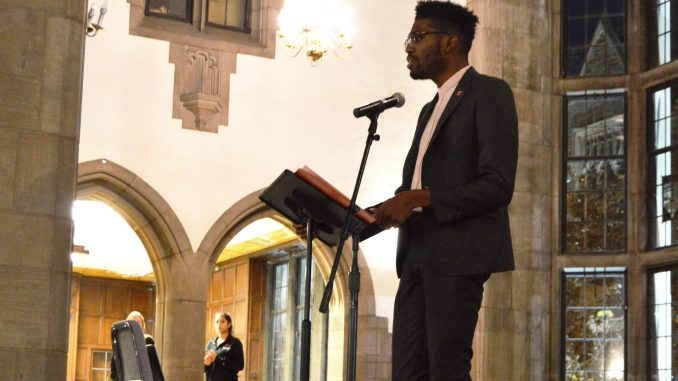
In 1991, Madap Sharma was expelled from his home country of Bhutan for practicing Hinduism.
He spent the next 19 years living as a refugee in Nepal. In 2010, Sharma moved to the United States before settling in Philadelphia two years later to be with his mother and father, who came to the U.S. in 2012.
“It was in those conditions, in the camps, that I rebuilt my life,” Sharma said.
On Friday, Sharma told his story at the Breaking Bread Across Borders Gala in Mitten Hall. The event, which was hosted by the student organization Temple Refugee Outreach, raised $3,100 for Books Not Bombs, an international campaign established by the Karam Foundation, which provides college scholarships for Syrian refugees. The foundation, a Chicago-based nonprofit, has provided aid to Syrian families and developed education programs for young Syrian refugees.
More than 2,500 refugees arrived in Pennsylvania between October 2016 and September 2017, according to the Pennsylvania Refugee Resettlement Program.
“I think the concept of Books Not Bombs was so powerful and close to my heart because I know how I felt and the struggle of my own education,” Sharma said. “I was suffering. I had to choose either food or books.”
About 200 people attended the gala, including representatives from the Office of International Affairs and Temple’s Center for the Study of Force and Diplomacy, which is housed in the Department of History.
Senior global studies majors Erin Heald, Alex Voisine and MacKenzie Bonner and senior marketing major Katie Pfeil founded Temple Refugee Outreach together last year. They collaborated with Maddi Gray, a senior political science and global studies major, to organize the gala.
“We wanted to bring a platform to Temple where students could connect with locally displaced people, [specifically] in Philadelphia,” said Heald, the fundraising chair of Temple Refugee Outreach.
Several groups co-sponsored the gala, including the Office of International Affairs, the Department of History and CENFAD. Temple Refugee Outreach also held several fundraisers on Main Campus at places like Maxi’s to pay for the gala and raise awareness about issues refugees face in Philadelphia and across the U.S., which can include lack of access to housing and employment.
Student Body President Tyrell Mann-Barnes spoke at the gala. He told attendees it is important to find ways to reduce barriers to education for vulnerable populations, like refugees.
One of the gala attendees, Shanna Washington, a senior Spanish and psychology major, said she was impressed the event was organized just by students.
“It’s important for Temple to be involved,” Washington said. “It’s scary that an entire generation of potentially educated people can be wiped out.”
Heald said Temple Refugee Outreach hopes to meet with administrators next semester to discuss waiving tuition for 10 refugee students in Philadelphia.
“These are Philadelphia residents who want to go to school who are just like us,” Heald said. “We wanna get them here.”
Heald first contacted Sharma after watching his TED Talk on his journey as a refugee. And after communicating via email for the past month, Heald invited him to share his story at the banquet.
In the early 1990s, Sharma was one of about 100,000 Nepali Bhutanese, or people ethnically from Bhutan’s neighboring Hindu country Nepal, who were expelled or fled from the country. This refugee crisis resulted after the Bhutanese government adopted a “One Nation, One People” policy in 1989, which forced the culture of the Drupka, the majority ethnic group in Bhutan, on the Nepali Bhutanese through a compulsory dress code and a ban of teaching Nepali language in schools.
After protests by the Nepali minority against these policies, the government destroyed many of their homes and forced them off their lands, according to a 2003 Human Rights Watch report.
During his next 19 years living as a refugee in Nepal, Sharma said he used his unfortunate circumstances — the lack of a permanent home and citizenship — to motivate himself to gain an education and become a teacher.
“I took that as an opportunity to produce something,” Sharma said. “I didn’t have anything to lose.”
Sharma went on to earn a master’s in English from Tribhuvan University in Nepal and a master’s in sociology from Kumaun University in India. He then completed his master’s of philosophy in English language education from India’s English and Foreign Languages University.
During his time in Nepal, Sharma trained teachers in remote districts of the country. He also founded an English school with a focus on educating girls.
“In the school I was teaching, in one of the classes, there were about 50 students and only one girl,” Sharma said. “I could see she was cornered, and the teachers would only focus on the boys.”
Once in Philadelphia, Sharma founded the Bhutanese American Organization, which provides new Bhutanese refugees with assistance in areas like education, employment and cultural integration.
For Sharma, the gala was an important step in alleviating the obstacles young refugees face when seeking an education.
“When I first heard about [the gala], I was so moved,” Sharma said. “I was so thankful that it came, there couldn’t be a better time. There are so many men and women who want to go to school and pursue education…but cannot because of external factors.”
CORRECTION: This article previously misstated Erin Heald’s position in Temple Refugee Outreach.
UPDATE: This article has been updated to reflect additional information.
Alex Voisine has written columns in the Opinion section for The Temple News. He had no part in the reporting or editing of this piece.


Be the first to comment